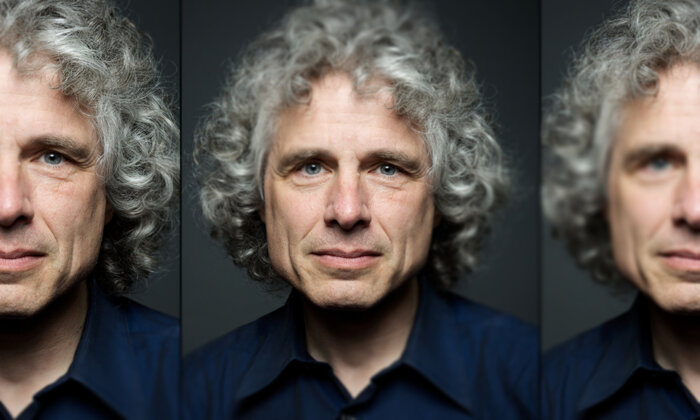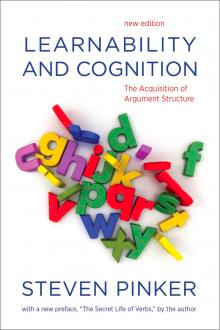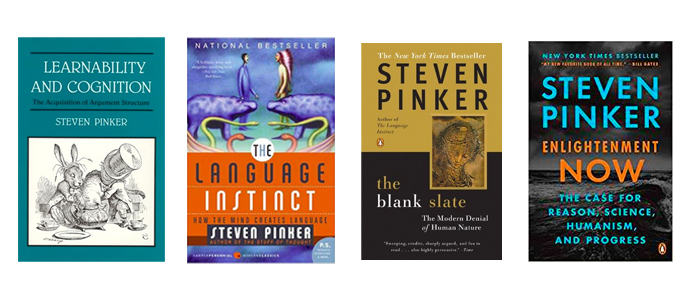From Verbs to War: In Conversation With Steven Pinker

Few academics have moved from the rarefied circles of academia to the high-profile world of trade book publishing as seamlessly as Steven Pinker. Ever fewer have the distinction of having written Bill Gates’s “favorite book of all time.” But long before the Harvard cognitive psychologist popularized Noam Chomsky’s theories on language, published a quintessential style guide for writing in the 21st century, and meticulously charted hundreds of years of human progress, he studied smaller problems — “academic bread-and-butter problems,” as he once described them to science writer Carl Zimmer.
Those problems — understanding the ways in which children acquire language and use irregular verbs — laid the groundwork for “Learnability and Cognition,” an academic monograph published by the MIT Press that helped pave the way for Pinker’s first book for a general audience, “The Language Instinct.”
In an email exchange with the MIT Press Reader, Pinker reflected on his circuitous road to popular science writing, the power of verbs, and more.
The MIT Press Reader: Your latest book, “Enlightenment Now,” has sparked strong reactions from readers. What would you say is the reaction that has — pleasantly or unpleasantly — surprised you the most?
Steven Pinker: One unpleasant surprise was to read reviews which bizarrely blamed the Enlightenment for slavery, racism, and imperialism. The accusation is bizarre because these blights are as old as civilization — anyone who has been to a Passover Seder or has seen the movie Spartacus knows that slavery was not invented in the 19th century — and it was only during the Enlightenment that anyone advanced the idea that slavery and imperial conquest were categorically wrong.
One pleasant surprise was a string of invitations from centrist and liberal politicians inviting me to confer with them, not to offer suggestions on policy or strategy, but to affirm that the value of liberal democracies, regulated markets, and institutions of international cooperation are worth defending. Another was correspondence from people who said that “Enlightenment Now” relieved them of a paralyzing depression and anxiety induced by reading the news. Ever since I was anointed a “psychologist,” I have had to disabuse people of the assumption that I am in the business of improving mental health, but I finally may have earned that credential.
Ever since I was anointed a “psychologist,” I have had to disabuse people of the assumption that I am in the business of improving mental health.
The Reader: “Enlightenment Now” may be the first of your books that at least some of your readers have read. Some might be surprised that one of your earliest works, “Learnability and Cognition,” was with the MIT Press and on a completely different topic: how children learn to use verbs. Is there any connection between these two topics, language learning and human progress, something that might not be obvious to the casual reader?

S.P.: Admittedly, the path that led me from children’s acquisition of give, fill, and pour to the history of war, pestilence, and famine was a circuitous one. It began with expanding my view of language itself to ask what it was all about, leading to the argument in “The Language Instinct” that language is an evolutionary specialization, a kind of hybrid of Chomsky and Darwin. That led to the question, if language is a human instinct, what are our other instincts, which I tried to answer in “How the Mind Works.” Speaking of unpleasant surprises, that book aroused a backlash at the very idea that human emotions and thought processes were shaped by evolution, both from the political right and the political left. So I analyzed the moral, political, and emotional baggage of the concept of human nature in “The Blank Slate: The Modern Denial of Human Nature.” In that book I argued that the existence of human nature, complete with nasty urges like revenge, tribalism, lust, and self-deception, did not license a reactionary fatalism, because human nature is complex, embracing not just destructive impulses but also constructive faculties like empathy, self-control, reason, and yes, language — that history tells us that humans have in fact reduced their rates of violence, and I gave some examples such as the abolition of slavery and the decline of homicide rates in England since the Middle Ages. When I reiterated those observations in a blog post a dozen years ago I received correspondence from historians and social scientists in diverse fields saying that I could have adduced even more quantitative evidence that violence had declined over time. These findings were unknown to me, and to most people, and I realized they needed to be better known and explained, which led to “The Better Angels of Our Nature.” That in turn led me to discover datasets showing that it was not just violence that we have been learning to tame, but also poverty, disease, hunger, illiteracy, and drudgery — hence “Enlightenment Now.”
The Reader: Back to “Learnability and Cognition” — you were gracious enough to write a new preface to the book when we published the 2013 edition. In that preface, you mentioned a colleague who once quipped, “[Verbs] really are your little friends.” What is it about verbs that you find so fascinating? What makes them more interesting to a cognitive scientist than other kinds of words?

S.P.: A verb is the chassis of a sentence — a frame onto which the other parts, like the subject, object, and subordinate clauses, get bolted. So a verb takes you from mere concepts, like dog and man, which are just things in the world, to propositions, like Man bites dog, which can be true or false, interesting or surprising. I wrote “Learnability and Cognition” after I realized that verbs not only express who did what to whom in a sentence but are themselves assemblies of more basic conceptual elements like “cause,” “act,” “event,” and “change,” and capture construals of the world, not just actions. Why can you pour water into a glass or fill a glass with water, but you can’t pour a glass with water or fill water into the glass? It’s because pour means “cause a liquid to change location” whereas fill means “cause a container to change state,” and the different construals of the same event determine which words may be used to describe those events. A dissection of the meaning of verbs reveals the conceptual components of thought.
The Reader: With the explosion of research as well as popular interest in AI and machine learning in recent years, how do you envision its impact on the field of cognitive science? Will cognitive science as an interdisciplinary “gathering place” for psychologists, philosophers, linguists, neuroscientists, computer scientists, and anthropologists interested in the mind-brain persist? How do advances in computation, as well as neuroscience, shift the balance in the field?
Mindless neurophysiology and machine learning have each hit walls when it comes to illuminating intelligence.
S.P.: I like to think so. Cognitive science emerged in the 1970s when it became apparent that experimental psychology by itself was insufficient to understand the human mind; it needed injections of theory from theoretical computer science and philosophy, together with information about the richness of language from linguistics. Cognitive science itself became overshadowed by neuroscience in the 1990s and artificial intelligence in this decade, but I think those fields will need to overcome their theoretical barrenness and be reintegrated with the study of cognition — mindless neurophysiology and machine learning have each hit walls when it comes to illuminating intelligence.
The Reader: Finally, in a 2011 New York Times interview, you mentioned that you began studying psychology because you were deeply interested in human nature from your early years. As a hugely successful researcher and writer, what’s your own assessment of your current grasp of human nature? Do you think your adolescent self would be satisfied with the questions and answers your adult self has pursued? What else about human nature is puzzling to you?
S.P.: I do feel that my younger self would be astonished and illuminated by the synthesis of computational cognitive science, evolutionary psychology, behavioral genetics, linguistic theory, deep history, and data science that I have tried to weave into my various books. At the same time, I’m humbled by many remaining mysteries. Why are identical twins not identical? How can a neural network represent the meaning of a sentence? Why do children show bursts of development in language? Why do nations not see the obvious advantages of peaceful global cooperation? My graduate advisor Roger Brown encouraged me to study children’s language but with the warning that I’d never really understand what children were doing, and I’ve had to accept that limitation in everything I’ve studied.



